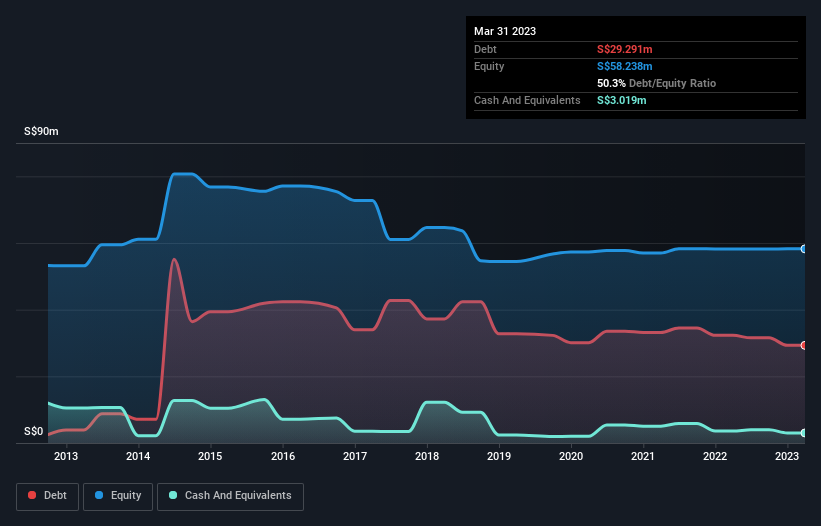- Singapore
- /
- Retail Distributors
- /
- SGX:C04
Health Check: How Prudently Does Casa Holdings (SGX:C04) Use Debt?
David Iben put it well when he said, 'Volatility is not a risk we care about. What we care about is avoiding the permanent loss of capital.' So it might be obvious that you need to consider debt, when you think about how risky any given stock is, because too much debt can sink a company. As with many other companies Casa Holdings Limited (SGX:C04) makes use of debt. But is this debt a concern to shareholders?
When Is Debt A Problem?
Generally speaking, debt only becomes a real problem when a company can't easily pay it off, either by raising capital or with its own cash flow. Part and parcel of capitalism is the process of 'creative destruction' where failed businesses are mercilessly liquidated by their bankers. However, a more common (but still painful) scenario is that it has to raise new equity capital at a low price, thus permanently diluting shareholders. By replacing dilution, though, debt can be an extremely good tool for businesses that need capital to invest in growth at high rates of return. When we think about a company's use of debt, we first look at cash and debt together.
Check out our latest analysis for Casa Holdings
How Much Debt Does Casa Holdings Carry?
You can click the graphic below for the historical numbers, but it shows that Casa Holdings had S$29.3m of debt in March 2023, down from S$32.3m, one year before. However, because it has a cash reserve of S$3.02m, its net debt is less, at about S$26.3m.

How Healthy Is Casa Holdings' Balance Sheet?
The latest balance sheet data shows that Casa Holdings had liabilities of S$7.18m due within a year, and liabilities of S$30.3m falling due after that. Offsetting these obligations, it had cash of S$3.02m as well as receivables valued at S$4.69m due within 12 months. So it has liabilities totalling S$29.7m more than its cash and near-term receivables, combined.
Given this deficit is actually higher than the company's market capitalization of S$20.8m, we think shareholders really should watch Casa Holdings's debt levels, like a parent watching their child ride a bike for the first time. Hypothetically, extremely heavy dilution would be required if the company were forced to pay down its liabilities by raising capital at the current share price. There's no doubt that we learn most about debt from the balance sheet. But you can't view debt in total isolation; since Casa Holdings will need earnings to service that debt. So if you're keen to discover more about its earnings, it might be worth checking out this graph of its long term earnings trend.
Over 12 months, Casa Holdings reported revenue of S$23m, which is a gain of 13%, although it did not report any earnings before interest and tax. We usually like to see faster growth from unprofitable companies, but each to their own.
Caveat Emptor
Over the last twelve months Casa Holdings produced an earnings before interest and tax (EBIT) loss. To be specific the EBIT loss came in at S$640k. Considering that alongside the liabilities mentioned above make us nervous about the company. It would need to improve its operations quickly for us to be interested in it. But on the bright side the company actually produced a statutory profit of S$1.6m and free cash flow of S$320k. So one might argue that there's still a chance it can get things on the right track. When analysing debt levels, the balance sheet is the obvious place to start. But ultimately, every company can contain risks that exist outside of the balance sheet. For example, we've discovered 5 warning signs for Casa Holdings (2 are a bit unpleasant!) that you should be aware of before investing here.
If, after all that, you're more interested in a fast growing company with a rock-solid balance sheet, then check out our list of net cash growth stocks without delay.
New: AI Stock Screener & Alerts
Our new AI Stock Screener scans the market every day to uncover opportunities.
• Dividend Powerhouses (3%+ Yield)
• Undervalued Small Caps with Insider Buying
• High growth Tech and AI Companies
Or build your own from over 50 metrics.
Have feedback on this article? Concerned about the content? Get in touch with us directly. Alternatively, email editorial-team (at) simplywallst.com.
This article by Simply Wall St is general in nature. We provide commentary based on historical data and analyst forecasts only using an unbiased methodology and our articles are not intended to be financial advice. It does not constitute a recommendation to buy or sell any stock, and does not take account of your objectives, or your financial situation. We aim to bring you long-term focused analysis driven by fundamental data. Note that our analysis may not factor in the latest price-sensitive company announcements or qualitative material. Simply Wall St has no position in any stocks mentioned.
About SGX:C04
Casa Holdings
An investment holding company, engages in the trading of electrical and electronic home appliances, kitchen and bathroom fixtures, and accessories in Singapore, Malaysia, Morocco, and internationally.
Solid track record with adequate balance sheet.
Market Insights
Community Narratives



